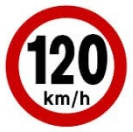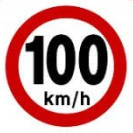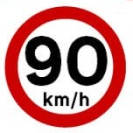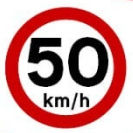Spain Driving Regulations
Last Updated: 17th Feb, 2021
The road network in Spain is one of the best and most developed in Europe with more than 16,000 km of High Capacity Roads, as they are called locally. This includes national roads, motorways and express ways. The majority of roads are free of charge, but there are also roads with tolls (called Peaje). They use a ticket based system that calculates the distance you drove on the motorway, which you pay when you exit the motorway.
The state of the roads is good to very good in most parts of the country, especially in the centre and the east. Driving on the right hand side of the road is the rule in Spain, and so is the right hand side has priority. Always pay attention to crossroads, even when you strongly believe you have priority.
What are the speed limits in Spain
Speed limits in Spain are in kilometres and range from 50 km/h inside urban areas, 90 in province and state roads, 100 on national roads and 120 on motorways. Observing the speed limits is a general rule in Spain as fines are quite high and you will be required you to pay on the spot if you are speeding and stopped by the police. If you are unable to pay on the spot the police are entitled to impound your car. So it is a good idea to carry a bank card or cash on you at all times when driving.
What side of the road does Spain drive on?
In Spain you drive on the right hand side of the road, and you will overtake on the left. The steering wheel is on the left side of the car. At a roundabout you travel in an anticlockwise direction, drivers already on the roundabout have priority over drivers approaching the roundabout.
Seatbelt Safety
Wearing the seatbelts is mandatory for all passengers and using the mobile phone without a hands free is strictly forbidden. A thing they go crazy about in Spain, is anti-radar or radar warning equipment – pack them up and put them in your booth when you enter Spain (you’ve been warned!).
Parking in Spain
Parking can be a major issue in Spain , especially in big cities during the Summer months. Parking is paid, most of the time, so always carry a bit of change with you in case of need (some parking meters are old and may not accept bank cards). The meter will issue a ticket that you’ll have to display visibly on the front side of your car.
If you do get a parking for exceeding the permitted time you purchased, the fine can be as much as €70 depending on the region. Don’t panic the good news is if you pay the fine within an hour it will only cost you €3 or €4 euros. After one hour it goes up to around the €7 mark. You can pay the fine at the parking meter. See if you can locate the parking warden and they will assist you.
Driving License
You’ll need to be at least 18 years old to drive in Spain. European driver’s licences are accepted. For those outside Europe, your license needs to be written in Latin characters or, otherwise, you should be in possession of an official document containing a translation.
CDW Insurance
When you rent a car in Spain insurance will be included in your rental, but in some cases it will have an excess or deductible.
This can range from €100 to €1,500 depending on the car hire company and location. It is a good idea to take out excess reimbursement insurance which will refund the excess cost in full to you. You can take a daily or multi trip annual policy. Read more
In the event of an accident, you along with the other driver must fill in, a special accident form provided by the insurance company. If there are injured passengers or pedestrians, inform the authorities immediately by phoning the national emergency number 112.
For more information regarding Spanish roads and traffic rules, access the website of the General Traffic Direction of the Spanish Government – www.dgt.es
Can I take a rental car out of Spain?
Yes it is possible to take a rental car from Spain cross border to a neighbouring country, such as Portugal, France Gibraltar and Andorra, however there will be an additional fee in most cases.
For more information on taking a rental car from Spain into Portugal please read This post .






Leave a Reply
You must be logged in to post a comment.